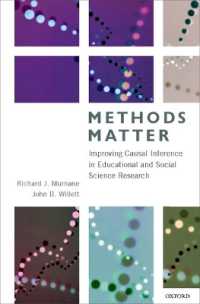Full Description
Special education's future is threatened by anti-scientific sentiment and poor thinking about school reform. The devolution of special education has been caused by decades of illogical, destructive criticism and a focus on issues other than ensuring a free, appropriate public education (FAPE) for individuals with educational disabilities. Special education now needs a second revolution to reinstate its nature and purpose so that it can evolve as it should.
Revitalizing Special Education presents neither a pessimistic nor a Pollyannish view of past or future, but rather is a careful assessment of some of the greatest threats to robust special education posed by distorted and misguided thinking about what special education is and does. Chapter authors propose logical and scientific analyses of problems and steps required to realize special education's promise, relying on empirical data and logical, linear thinking to confront educational issues, both philosophical and practical.
A full range of alternative futures for special education must be considered. However, revolutionary thinking about possible futures is necessary for revitalization and meaningful evolution. The contributors to this book take up the details of thought and practice that are necessary for such revolution and evolution.
Contents
Foreword; Garry Hornby
Chapter 1. This One, Not That One: Toward Revitalizing Special Education; James M. Kauffman
Chapter 2. This Office, Not That Office: The Structure of Public Education; Kimberly Vannest, Mary Rose Sallese, and Corey Peltier
Chapter 3. Why the Continuum of Alternative Placements is Essential; Mitchell L. Yell and Angela Tuttle Prince
Chapter 4. A Strong Foundation: A Scientific Frame of Mind for Evidence-Based Practices; Timothy J. Landrum
Chapter 5. Meeting Instructional Needs: Delivery of Evidence-Based Special Instruction; Paige C. Pullen
Chapter 6. Not Everything Can Be Special: Appropriate Education for Severe Disabilities; Jason Travers
Chapter 7. Veil of Tiers or Happy Tiers? Multi-Tiered Systems of Support; Andrew L. Wiley, Becky Ann Harker, and Tricia McCollum
Chapter 8. How Effective is Special Education? A Best-Evidence Synthesis; Cecelia A. Gloski, Adrienne D. Woods, Yangyang Wang, and Paul L. Morgan
Chapter 9. Special Education Should Include Advanced Learning Needs; Melanie S. Meyer and Jonathan A. Plucker
Chapter 10. Special Education's Deterioration and Needs: A Personal Perspective; Betty A. Hallenbeck
Chapter 11. Where Now? Alternative Futures for Special Education; Nicholas A. Gage








